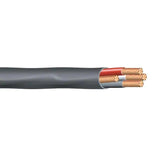What Size Wire Should You Use for a 50 Amp Circuit Breaker?

Circuit breakers are electrical safety devices designed to protect an electrical circuit from damage caused by excess current from an overload or a short circuit. 50 AMP Circuit breaker is common for high-demand appliances in residential, commercial, and industrial settings.
Based on allowable ampacities of the aluminum and copper wires, you should use 6 AWG copper wires and 4 AWG aluminum wires in the 50 Amp circuit breaker. These are the recommendations for cables that run for 100 feet or less, the most common distance for cables powering the 50 Amp circuit breaker.
8 AWG copper wire and 6 AWG aluminum wire are not recommended despite having the 50 AMP-60 AMP ampacity rating because the National Electrical Code (NEC) states that the maximum loading capacity of the electrical circuit should not exceed 80%.
For runs larger than 100 feet, you should account for voltage drop and use larger cables. For example, you should use a 3/0 AWG copper wire or a 4/0 AWG aluminum wire for a 200ft cable run.
The size and type of wire used for the circuit breaker does not depend on the type of circuit breaker. Standard circuit breakers, AFCI circuit breakers, and GFCI circuit breakers will use the same cables.
Since we have this question settled, let's focus in more detail on the sizes of cables for other circuit breakers, the applications of a 50 AMP circuit breaker, and the types of cables that work well with a 50 AMP circuit breaker.

Size of Wires For Other Circuit Breakers
Here are the sizes of circuit breakers for other common cables in a house:
- 10 AMP Circuit Breaker - 16 AWG Copper, 14 AWG Aluminum
- 15 AMP Circuit Breaker - 14 AWG Copper, 12 AWG Aluminum
- 20 AMP Circuit Breaker - 12 AWG Copper, 10 AWG Aluminum
- 25 AMP Circuit Breaker - 10 AWG Copper, 8 AWG Aluminum
- 30 AMP Circuit Breaker - 10 AWG Copper, 8 AWG Aluminum
What are the Applications of a 50 Amp Circuit?
50 Amp circuit breakers are used in residential, commercial, and industrial settings. For a house, these are considered the circuits for high-demand appliances. They are used to power electric power dryers, ovens, air conditioning units, and hot tubs. The more common sizes of circuits in a house are 15 AMP and 20 AMP.
Other appliances and zones that can have a dedicated a dedicated 50-amp circuit are:
- Electric ovens
- Heavy-duty electric dryers
- Central air conditioning units in large houses and medium offices
- Hot tubs and spas
- Electric vehicle charging stations
- RV Power Outlets
- Backup Generators
- Home workshops
In commercial settings, 50 Amp circuits are common for:
- Commercial kitchens (restaurants, cold kitchens etc.)
- HVAC Units
- Laundry services
- Machinery
- Park and recreation facilities
- Street lighting
- Sports Complexes
- Irrigation systems
In industrial settings, 50 Amp circuits are common for:
- Pump stations
- Welders
- Standalone high-power demand machinery
- Conveyor Systems
- Production Lines
- Generators
Types of Cables Used with 50 Amp Circuit Breakers
50 AMP circuit breakers use all types of popular circuit wire. Namely, these are:
- THHN/THWN in both copper and aluminum. This cable is put in a conduit. It is the most popular option for circuit breakers.
- NM-B Non-Metallic Sheathed Romex® Cable in copper
- UF-B cables for circuit breakers located outdoors
- MC metal-clad cables
- Service entrance cables in copper and aluminum



























